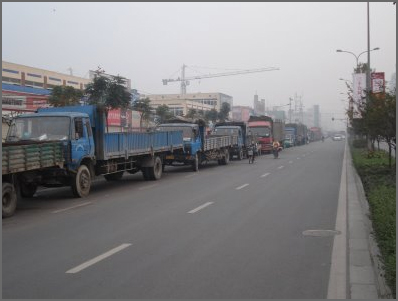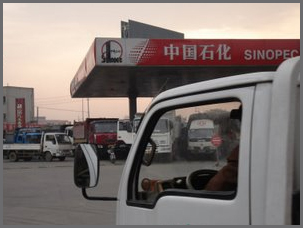|
TUESDAY EDITION February 3rd, 2026 |
|
Home :: Archives :: Contact |
 |
Living the Diesel Shortages in ChinaDave DuBynewww.daveseslbiofuel.com daveseslbiofuel@gmail.com December 4, 2007 
Trucks are lining up in their hundreds at three stations in Chengdu, China, in the hopes of getting 40 litres of fuel each. In this city of 10 million, only those three are still selling diesel. This may be an economics-induced dress rehearsal of the reality that will face the rest of the world in the post-peak oil universe, writes the author. I am currently living in China and I hear the Chinese media speaking about diesel shortages, but the message they prefer to deliver is“take the shortages with a grain of salt”. International media are also covering the story of limited supplies, but what I have still not seen covered is the effect of limited diesel supplies on the economy and the population as a whole. The story goes something like this: Inflation is out of control at 6.5 per cent and prices of everything have at least doubled in the last year and a half. Wages remain almost stagnant with no upward rise to match the inflation rate. Five years ago, when China’s economic boom started, dreams were alive in the air: a new car, a new apartment and a better life filled with possessions if you came to the cities and worked real hard. That is exactly what happened, a flood of workers came to man the factories, build new skyscrapers, and fill offices by the hundreds of millions. The carrot dangled in front of 1.3 billion people was simple: come, work and be rewarded. That was then, this is now. The dream is dying on the vine. A majority of Chinese citizens now realize that car ownership will not occur for them, same goes for the apartment. Property values are skyrocketing, from 2500 yuan for a square metre in 2003, to 10,000 yuan for a square metre in today’s high-rises. With unfulfilled dreams of car and home ownership, average workers trudge through their days knowing that the basic necessities and a night out on the town is all they will get in life. With inflation running at 6.5 per cent now what little income there was is being eroded, and the dreams of nights out on weekends are starting to disappear. Doubling food prices are making the country tighten spending and more grumbling from the average person on the street. To highlight social stress inflation is causing: “Stampede leaves 3 dead, 31 injured” is a headline that sums up the situation. Carrefour supermarket had a special on cooking oil which was discounted $1.55 from the regular $7 price. The promotion saw bargain shoppers lining up at the store entrance at 4 a.m. When the doors opened at 8:40a.m., there was a stampede to the aisles. Fights over the bottles of oil began, and shoppers were pushed to the floor. Some were trampled to death. Those that went to the hospital for injuries had bruises and gashes to the face, hands and forearms caused by other shoppers using cans as weapons to loosen the grip of those with bottles in hand, and retrieving dropped bottles. This incident is also a result of bio-fuel production interfering with food production and driving up cooking oil prices. Inflation was not the only cause. It has been a culmination of lost dreams, minimal income, rising food prices and no end in sight of rising cost of daily life that made last month’s 10 per cent rise in fuel prices unpopular and added another nail to the coffin. Those that were able to afford cars within the last few years are now complaining about filling up the tank. Two years ago gasoline was 2.5 yuan per liter, now it sits at 5.8 yuan. China’s national government sets fuel prices, and with the Olympics approaching they want no civil disorder like that which Myanmar experienced after their fuel prices climbed. The illusion of a harmonious society needs to be maintained through the Olympics to generate more foreign investment. Another rise of fuel prices of 20-30 per cent will bring the refiners to the break even point when selling refined fuel in China, but will also cause transport drivers to strike and the gentle old lady on the street corner selling roasted chestnuts to become a fire breathing dragon asking for change. Chinese citizens have put the equation together: Higher fuel prices = higher food prices. Based on the complaints I hear from my students about high prices, the central government would be asking for trouble with another fuel price hike. This puts the central government squarely in the center of a catch 22. If they raise fuel prices, refiners will produce more since they are not losing money, but civil disorder may occur. If they do nothing and the shortages will continue for the next six months, the manufacture and export sector will continue to slow down, slowing the entire economy. That is until the Olympics are finished! Those are individual drivers with cars, but diesel shortages for the transport and logistics industry, which support the bread and butter of the Chinese economy, manufacturing and export. Long lines at petrol stations are common countrywide, and this is not limited to the east coast, as some western media have reported. All cities and all provinces are experiencing lack of adequate diesel. The obvious slowdowns in delivery of imported materials to factories from ports, missed loading dates for containerized shipment.  There are now holes in delivery drivers’ pockets, since they are no longer able to earn a month’s wage. Drivers paid by the trip are waiting up to 5-6 hours for a rationed 200 yuan of diesel per stop. This will buy them 40 litres of fuel – but first they have to drive around the city until they find an open station with diesel to sell. Truck drivers are basically working part-time now. They do not get paid to wait in line. Frequent talk about drivers changing occupations to earn a wage is common. They have to do something else for work to feed the family. There are now holes in delivery drivers’ pockets, since they are no longer able to earn a month’s wage. Drivers paid by the trip are waiting up to 5-6 hours for a rationed 200 yuan of diesel per stop. This will buy them 40 litres of fuel – but first they have to drive around the city until they find an open station with diesel to sell. Truck drivers are basically working part-time now. They do not get paid to wait in line. Frequent talk about drivers changing occupations to earn a wage is common. They have to do something else for work to feed the family.
Contracts signed with a specified delivery date and late charges penalties and no longer valid. If your delivery is late by days or a week, that’s life. Cancelled orders and partial delivery to customers overseas are now standard. A number of logistics company vehicles are grounded all along the coast from Shanghai to Shenzhen waiting for their 40 litres of fuel as lines spill out onto highways creating traffic jams on interstates or company vehicles parked in a lot not moving at all. I have been travelling in both the countryside and city taking notice of petrol stations and changes in the society because of this situation. What I have noticed is the number of stations that are simply closed. Trucks, wooden plank boards or plastic ropes block entrances to the pumps. Buses now leave when full – a far cry from the earlier norm of regular hourly service that left on time even if you were the only passenger on board. A new 1 yuan fuel surcharge is added on to every taxi ride and bus ticket you now purchase. The countryside seems to have more diesel than the city areas. I saw no lines in rural areas, but the city is a different story. Lines of waiting trucks were longer last week than today in western China, a sign that the shortages have eased a bit, maybe. Drivers seem to be taking it in good spirits. There is little violence in line as the army and police are at stations to keep order, but the economic trickledown is still to be felt. Job shifts, less earned income per month, cancelled factory orders, late orders, missed loading dates, difficulties in transporting materials to and from ports, will add up as some sort of ripple through the economy. What I see occurring here is a dry run for worldwide energy shortages that may be around the corner as decreasing production from older wells continues to outpace new discoveries of oil on our planet. These diesel shortages will eventually ease if the proper amount of money is paid to the refiners in China – these shortages are based on economics. Declining global oil production, on the other hand, will be permanent. Those shortages will be based on geology. There is a huge difference. This shortage in China is diesel only. All other fuels are available at the moment, so keep an eye on the economic information coming out of China from November and the trickle down of lost revenue. The outcome should be mirrored in every other economy that experiences fuel shortages in the future. When energy shortages become permanent, these are the effects you can expect in the city near you. Dave DuByne www.daveseslbiofuel.com daveseslbiofuel@gmail.com http://languageinstinct.blogspot.com December 4, 2007 David DuByne is from the United States and is presently living and teaching Business English in Chongqing, China. He and webmaster Marc Hastenteufel are translating www.daveseslbiofuel.com, an English teaching web site devoted to bio-fuel and oil depletion, for those studying English around the planet into Mandarin Chinese. Robert Rapier, an expert on cellulose ethanol, gas-to-liquids (GTL), and butanol production, also provides technical assistance for content throughout daveseslbiofuel in the renewables and conservation section. |
| Home :: Archives :: Contact |
TUESDAY EDITION February 3rd, 2026 © 2026 321energy.com |
|